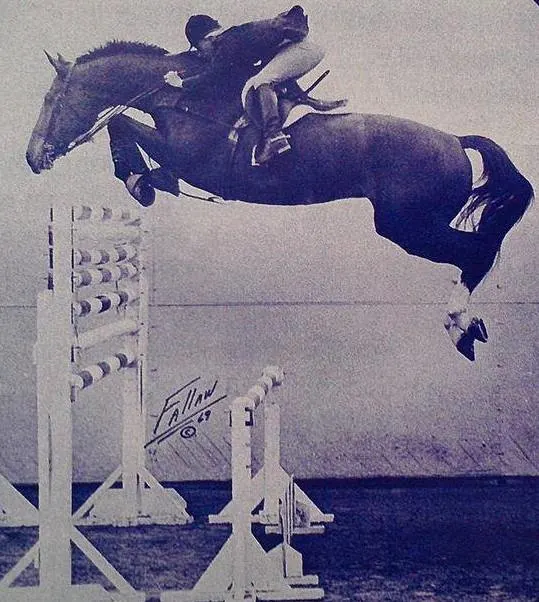For DiAnn Langer the tipping point came in January of 2018. For months, titans in the entertainment and business world had been tumbling, thanks to allegations of sexual misconduct, and the Catholic Church was in the hot seat for how it handled allegations of abuse. All of this reignited the complicated feelings surrounding Langer’s own abuse at the hands of her childhood riding instructor. But when she saw the teenage gymnasts testifying during the sentencing of USA Gymnastics doctor Larry Nassar she made the decision to tell her own story.
“I remember watching them on TV during their trial. I broke down crying, and I said to my husband, ‘I’ve got to do this,’ ” she recalled. “He said, ‘I’m right here with you all the way.’ If the young gymnasts could stand there and graphically explain what happened to them—I’m an adult woman. I can stand up and take it also.”
Some of the same factors pushed Anne Kursinski to share her story of sexual assault at the hands of legendary horseman Jimmy Williams.
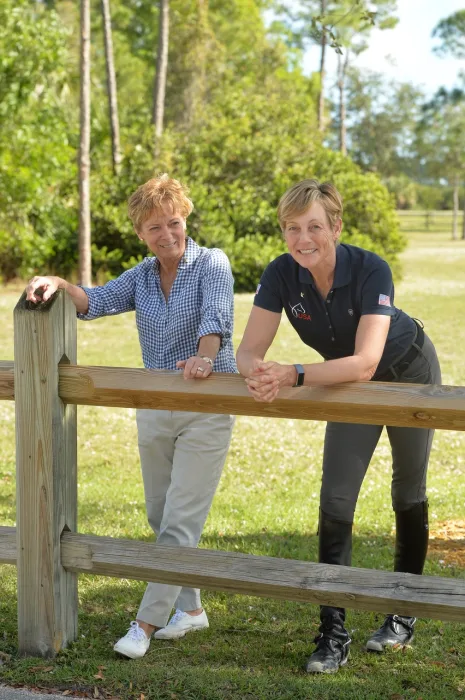
USEF Youth Chef d’Equipe DiAnn Langer (left) and USEF Developing Chef d’Equipe Anne Kursinski spoke about their past abuse at the hands of their childhood horse trainers in order to help young riders in the sport. Vicci Valenti Photo
“It started with Hollywood and the gymnasts, and I could hear this little voice inside me saying, ‘I’ve dealt with it, and I’m good with it personally,’ ” she said. “I love my sport; I love little kids with horses and teaching and inspiring them. I sign books, ‘Follow your dreams,’ and I really mean it. Once I was 4 years old and horse crazy and fortunate enough to get to do it. It just seemed like the time was right to speak up. I wanted people to know they’re not alone, and I wanted to help the kids and the sport I love.”
Langer and Kursinski told their stories to The Chronicle of the Horse for a two-part cover story published in the magazine in April. While Langer told her story from a first-person perspective, Kursinski convinced three other survivors of Williams’ abuse—Francie Steinwedell-Carvin, Gigi Gaston and Karen Herold—to share their stories with the Chronicle as well as part of a larger article that touched on the SafeSport program.
An additional factor makes their revelations especially poignant and meaningful: Both Kursinski and Langer serve as chefs d’equipe for the U.S. show jumping program—Langer as the youth chef and Kursinski as the developing chef d’equipe. Their standing as preeminent, influential horsemen who work with young and up-and- coming show jumpers made them uniquely qualified to get out their message: Abuse of power of any kind is unacceptable in the sport.
Because of their bravery in sharing their stories, the leadership role each has taken against exploitation of power, and their support of the U.S. Center For SafeSport’s efforts, the Chronicle is honoring Langer and Kursinski as our overall horsemen of the year.
ROCKING THE HORSE WORLD
The testimony of Kursinski, Langer and the others shook the equestrian community and shined a bright light on a verboten topic. The articles were read more than 82,000 times online alone, and the Chronicle ran five pages of responses in the Feedback section of the magazine. Within a week of publication dozens of other horsemen shared their own personal stories of surviving sexual assault in the comments section of the online articles or on Facebook in relation to the article. More called and wrote to the magazine or the women in the articles to tell their stories. The New York Times picked up the story about Williams and ran an extensively researched piece, and the German sport horse magazine St. Georg published a similar story quoting the Chronicle.
For Michelle Thornton, the articles in the Chronicle hit especially close to home. Along with Kathy Farr, Cathy Eishen and Sheri Moser, she co-wrote a letter to the magazine about her abuse as a teen by California trainer John Lipari. It was her first time speaking publicly about the abuse, and the San Diego Tribune picked up the story shortly thereafter.
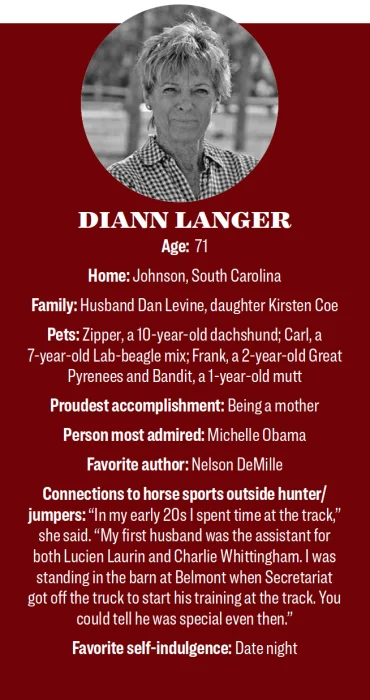 She said the courage of the survivors who spoke to the Chronicle sparked a feeling of relief after decades of nausea over the secret she’d shared with very few. The articles directly moved her to do something.
She said the courage of the survivors who spoke to the Chronicle sparked a feeling of relief after decades of nausea over the secret she’d shared with very few. The articles directly moved her to do something.
“I thought, ‘Wow, it finally hit the print. It’s finally out there,’ ” said Thornton, Rancho Santa Fe, California. “It really was the straw that broke the camel’s back. There’s so much shame around sexual abuse that it’s not really something that you want to share. It’s not the easiest thing to talk about, so there’s a sort of strength in numbers. I thought, ‘If they can do that, I’m going to get on that train.’ ”
While Langer and Kursinski’s candor empowered others and helped them heal, the revelations had real effects on the sport as well. In June the Show Jumping Hall Of Fame convened a special meeting to vote on whether to remove Williams from its ranks, ultimately deciding to eliminate him.
“The Board cited the ‘Rules for Induction into the Show Jumping Hall of Fame’ in the Hall of Fame’s By- Laws that include ‘integrity’ and ‘character’ among the attributes upon which an inductee’s standing should be based,” explained the press release that followed.
And as a direct result of the Chronicle’s article, Flintridge Riding School, Williams’ home for many years, retired the name of the main ring—it had been the Jimmy A. Williams Oval; now it’s simply called Ring 1—and they removed from their publicity their affiliation with him.
“I’m proud of what they did by stepping forward, and I admire their bravery in doing so,” said senior U.S. Chef d’Equipe Robert Ridland.
“THANK YOU FOR SPEAKING UP”
Overall the reactions received by Kursinski and Langer have been positive. Kursinski had shared part of her story earlier with close friends, so a few people knew what she’d been through. Over the years occasionally a trainer at a clinic would ask her to speak to a young rider dealing with similar challenges, but after the articles more people started seeking her out.
“At [USEF Show Jumping Talent Search Finals—East (New Jersey)] I had a mother come up to me after most people were gone and say, ‘Thank you for speaking up,’ ” recalled Kursinski. “Every now and then at a horse show a mother or woman or younger girls will thank me, and some will share their stories.”
When they received negative responses, Kursinski and Langer maintained their focus rather than responding with animosity or contrition.
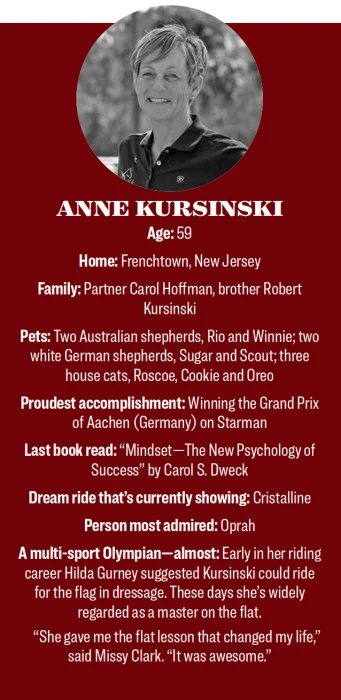 “Another trainer came to me and said, ‘I don’t agree. Jimmy’s dead,’ ” Kursinski recalled. “I just said, ‘I’m telling you it happened. I’m not making anything up.’ When they said, ‘I know, I know, but he’s not here to defend himself,’ I said, ‘I get it if that’s the way you feel about it.’ It did happen, and I got an apology from [Williams]. I know it’s true. I heard later that the person who confronted me was really surprised I didn’t yell or get really upset.
“Another trainer came to me and said, ‘I don’t agree. Jimmy’s dead,’ ” Kursinski recalled. “I just said, ‘I’m telling you it happened. I’m not making anything up.’ When they said, ‘I know, I know, but he’s not here to defend himself,’ I said, ‘I get it if that’s the way you feel about it.’ It did happen, and I got an apology from [Williams]. I know it’s true. I heard later that the person who confronted me was really surprised I didn’t yell or get really upset.
“The biggest thing we can do, agree or disagree, is just stand our ground,” she continued. “This happened to me. I’m sharing this so that I might save another kid’s life.”
Langer had a few disturbing negative responses from decades-old friends, inspiring her to write a follow-up column for the Chronicle that touched on some of the hateful reactions she received.
ADVERTISEMENT
“What I don’t understand is when some old friends say that we should not have opened this ugly door for fear it will make things worse,” she wrote. “Worse for whom? What about the next young girl or boy who is groomed and then molested? These children are whom it will be worse for. No, they seem to think that it will be bad for business and bad for the sport. I believe this discussion, no matter how hard, is good for the equestrian business and the sport.”
CARING AND INVESTED
Langer, 71, grew up riding and showing a small horse named Spright, and she soon became a sought-after catch rider at West Coast shows. After she aged out
of the juniors she got the ride on Fleet Apple, an extraordinary jumper she rode to many wins and in Nations Cup competition. When Fleet Apple was recruited to go east to serve as a U.S. team horse, Langer made the difficult decision to stay in California rather than trying to wedge her way into a regular spot in the closed ranks of the elite U.S. Equestrian Team.
“I strongly felt they wanted my horse, but they didn’t want me,” she said. “Fleet Apple went to the team, and [William] Steinkraus got the ride, and he went to the Olympics.”
Langer started her own business, and a few other top open jumpers came her way as she enjoyed a notable career. After the birth of her daughter, Kirsten Coe, she started focusing more on her business, taking on clients and running her stable, Langtree, out of the L.A. Equestrian Center. By 2006, when her daughter left to work for Andre Dignelli on the East Coast, she was looking for a new challenge, so the next year she sold her business, bought a plot of land in South Carolina, and built a farm where she started breeding jumpers. It wasn’t long before an additional opportunity came her way.
“My daughter called and said, ‘You know they’re looking for a chef, and everything they want you are. Please apply,’ ” recalled Langer. “I looked it up, applied [to the U.S. Equestrian Federation] and got the position, and I was hired in 2013.”
Dignelli first got to know Langer after she chose him to train Coe as a junior, and several of Dignelli’s students have worked with Langer in her role as youth chef.
“I view my friend DiAnn as an all-around great person and great horsewoman, who’s really caring,” he said. “I love the job that she’s doing with these young people. She’s really interested and invested in what’s happening with them, and she’s developing relationships with them. It’s really nice to see someone genuinely interested in seeing the future of the sport thrive and continue. I think it’s great that she’s re-invented herself this way.”
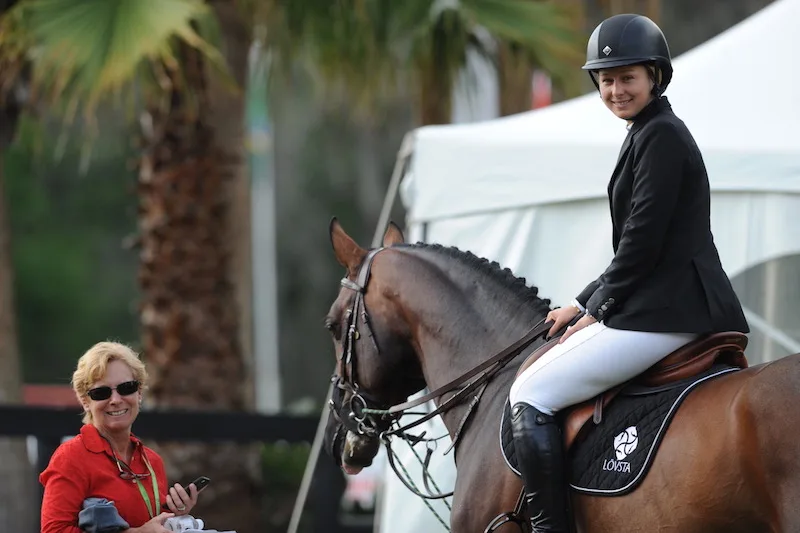
DiAnn Langer (left) was convinced by her daughter Kirsten Coe to apply for the USEF’s show jumping young rider chef d’equipe position. Mollie Bailey Photo
Langer threw herself into the position. She’s been active in improving the Adequan FEI North American Youth Championships, the Platinum Performance USEF Talent Search Finals on both coasts, and all the programs on the emerging jumper pathway. She also served as chef d’equipe for Team North America, which earned gold for the first time at last year’s Youth Olympic Games (Argentina), anchored by triple-clear U.S. rider Maddie Hatcher. She reads voraciously about coaching theory, and she attended the U.S. Olympic Committee’s American Development Model and Youth Sport Symposium in Colorado Springs.
Langer’s the first person to hold the youth chef title, and one of the most important parts of her job has been working directly with parents.
“They want to know, ‘What’s next?’ ” said Langer. “ ‘What does my child get out of this? What education will be offered? How will it help my child get into college? How can a rider who doesn’t have a big budget be successful?’ Answering these questions and coming up with programs that enhance [riders’] ability to get their talents out there is all on the table.”
At the most recent USHJA zone jumper championships in California, Langer called a meeting of all the chefs d’equipe.
“I addressed with them the issue of bullying, cyber bullying, and how they talk to their riders and other people,” she said. “I said that as leaders they had an obligation to understand that bullying or any sort of demeaning or demoralizing conduct from them would not be acceptable from me, and we would have an issue.”
A HORSEMAN’S HORSEMAN
Kursinski’s path kept her laser focused on competition for most of her career. She made her team debut in 1976 at Spruce Meadows (Alberta) when she was still in high school.
“That’s where the fire got lit of the excitement of international competition,” she said. “It was this whole other world—I got to see Hans Günter Winkler, Eddie Macken, Rob Ehrens, so many famous riders.”
Once she got a taste of riding for the flag Kursinski followed her Olympic dreams east in 1981. In 1983 she won her first major international grand prix, the Grand Prix of Rome, and that same year she earned double gold at the Pan American Games (Venezuela) on Livius. She was the alternate for the Los Angeles Olympic Games the following year, and she put in a stellar performance at the Seoul Olympics in 1988, finishing fourth individually and earning team silver with Starman, who also partnered with her at the 1990 Stockholm FEI World Equestrian Games. She rode Cannonball at the next Olympics in Barcelona and was back on the podium in Atlanta in 1996 with a team silver on Eros, whom she also took to the Rome World Games two years later. And in 2008 Kursinski was named the alternate for the Hong Kong Olympic Games with Champ 163.
Today Kursinski has several horses in the show ring and 20 horses at her Frenchtown, New Jersey, stable, Market Street Inc. She runs an online subscription lesson program as well. She’s earned a reputation as a horseman’s horseman and calls many of the best in the sport her friends.
“I think she’s one of the best at the job,” said Missy Clark. “Anne knows the ropes, and she does her chef’s job perfectly. She’s a great confidence builder and a great horsewoman. She’s someone you feel very confident to meet up with, whether it’s at a young riders championship or a senior Nations Cup team; you know she’ll have everything in place and be able to help however you need. She really knows what she’s talking about.”
These days Kursinski is more focused on teaching (both pure show jumpers and rising eventing stars like Caroline Martin), conducting clinics, and her work as chef, rather than riding in international competition, but she’s still in the show ring aboard several jumpers. She served as a selector for the 2018 FEI World Equestrian Games, so between observing at those events and serving as chef for several Nations Cup teams, including the FEI Youth Nations Cup Final (Belgium), she made five trips to European shows last year.
“I think Anne has an incredible way of communicating her experiences and channeling that to the athletes on her team and really bringing it alive for them,” said Lizzy
Chesson, the U.S. managing director of show jumping. “She’s great at helping others understand the importance and the honor it is to be part of a U.S. team.
ADVERTISEMENT
“DiAnn is passionate and very principled,” she continued. “When there are so many shiny things around she’s very disciplined in what she believes in and what she believes is correct. It’s also important that she can see opportunities to do something new and different.”
Ridland relies on Kursinski and Langer to help mold rising stars and build the base of the pyramid that supports the high performance riders.
“When I first got this job six years ago one of the first things I said in my opening remarks at the convention was that this isn’t a one-person job,” said Ridland. “I can’t believe that George [Morris], Frank [Chapot] and Bert [de Némethy] were able to do that.
“So it’s created a team of four, with Lizzy Chesson,” he continued. “We’re a team that’s been working together better and better, and our results have shown it. It’s a privilege to work together, and you can see the results of creating that pathway. By nature of the 3/2 plan [putting three senior riders and two up-and-comers on one team] I need to be in consideration of DiAnn and Anne. It’s so important to know as much as we can about these younger riders and make sure they’re not skipping any steps as they’re climbing the ladder.”
TAKING UP THE CAUSE
The adjective “strong” fits both Kursinski and Langer. Kursinski’s a notoriously disciplined instructor and rider, and Langer is tenacious and serious in her work, but neither is outspoken or brash. So it’s all the more meaningful that each overcame her very private persona to speak about intimate details of her life for the greater good.
Former U.S. team rider Armand Leone described abuse of power by trainers as an age-old phenomenon and feels discussion of it is overdue.
“There have always been vulnerable people in horse sport, because trainers hold the keys to the kingdom unless you’re very wealthy,” said Leone. “They hold the keys for how to ride a horse and how to win. They’re the gatekeepers, and if you want to get out of jail you’ll do anything for the guard.
“We have real problems with psychological and physical abuse in our sport,” he continued. “If you want to modernize the sport we need to clean house, strip the walls, and put on proper paint.”
Kursinski explained that the pause in a rigorous competition schedule meant she had the energy and focus to pick up this mantle. In January U.S. Equestrian Federation President Murray Kessler honored Kursinski with the Sallie Busch Wheeler trophy for her work championing SafeSport.

“I wanted to show kids that even if they had something crummy happen, life can go on, and there are infinite possibilities out there,” said Anne Kursinski. Mollie Bailey Photo
“It was time to speak up,” she said. “I wanted to show kids that even if they had something crummy happen, life can go on, and there are infinite possibilities out there.
“I had the opportunity to make a difference,” she continued. “We’re here on the planet for however long our lifetimes are. If I can help some other little kid—just one child—it will have been worth it.”
Langer sees her job as chef as an opportunity to take a stand against all forms of abuse of power.
“I feel strongly that the title of youth chef demands that I stand up or else give them back the title if I wasn’t going to take care of the youth like they need it,” she said.
Her daughter admires the strength she sees her mother portray in every facet of her life.
“In some regards she’s tough, but more than that she’s strong,” said Coe. “I think that when she puts her mind to something it’s accomplished, whether it’s developing a new program or athlete pathway, or coming forward as part of the #MeToo movement. Everything she does she sees through to the end. Whatever the outcome is she gives it her all. It takes strength to do that.”
You can read more about our decision to make Anne Kursinski and DiAnn Langer our overall horsemen of the year, as well as why we chose some of our discipline winners in our commentary for this issue.
This article appeared in the January 28 & February 4, 2019, issue of the Chronicle of the Horse. This year the Chronicle unveiled it’s new Yearbook issue with new stats, trends, highlights and lowlights and of course our Horse and Horseman of the Year for each discipline.
Writing the initial #MeToo article took months of research and travel for in-person interviews. If this kind of reporting is important to you, and you are not already a subscriber, please consider supporting the Chronicle by subscribing.
You can subscribe and get online access to a digital version and then enjoy a year of The Chronicle of the Horse and our lifestyle publication, Untacked. Or you can purchase a single issue or subscribe on a mobile device through our app The Chronicle of the Horse LLC.
If you’re just following COTH online, you’re missing so much great unique content. Each print issue of the Chronicle is full of in-depth competition news, fascinating features, probing looks at issues within the sports of hunter/jumper, eventing and dressage, and stunning photography.
What are you missing if you don’t subscribe?

